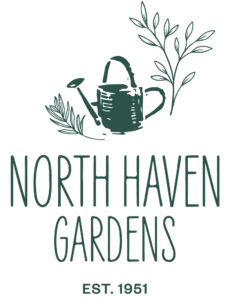Updated: February 28, 2024 Why don’t more commercial growers grow perennial milkweed? Milkweed seeds require…
The Bugs We Need
Felicia English with Rusty E. Allen, NHG Education and Outreach Coordinator
This month, I joined Felicia English to find out more about the fascinating world of those insects we consider beneficial, and I gained a sample of the interesting information this passionate, knowledgeable speaker will share with us in classes at NHG this spring.
Felicia is our Integrative Pest Management coordinator for Blue Label Farms in Wylie, Texas, sister to our North Haven Gardens operation. She has a Bachelor Degree in Horticulture from Stephen F. Austin State University, and a love affair with insects and other living things that stretches back to her childhood.
Rusty E. Allen: How did you come to work with us at Nortex, and why insects?
Felicia English: A friend put me in touch with Nortex and I liked what I saw so I jumped at the opportunity. I’ve always loved insects but when I started at the nursery I was in propagation. I moved from there to assistant grower and then to IPM manager. The idea of controlling pest problems with other insects fascinated me and I’ve never looked back. Now I’m the organic grower and IPM manager so I get to grow edible crops and still keep learning about and enjoying the insects that I love so much. They have fascinated me since I was a child. The colors, movements, and behaviors of these creatures are an endless source of delight to me. There are so many different varieties of insects and you can find them everywhere!
What is the most appealing part of your work?
It’s probably a toss-up between being able to work outside or getting paid to continue learning. I can’t imagine not being able to work in horticulture! It’s what I love and I fully intend to keep learning and sharing that love with other people however I can.
What is a beneficial insect and how do they relate to urban gardening environments?
A beneficial insect is one that performs a human valued service such as pest control or pollination. These little guys can do a lot for us in our urban gardens by controlling pest populations and offering their pollinator services in places that don’t see as many pollinators as a less developed space does. Some beneficial insects act as both pest control and pollinators by affecting different parts of the garden during different parts of their life cycle.
Aren’t all beneficials pollinators? How useful are those that aren’t? What do they do?
Not all beneficials are pollinators. These types of insects are generally the parasitic or predatory kind and are more interested in finding a place to lay their eggs or a tasty meal. They can be accidental pollinators if their prey happens to be close to the flower but it’s not their main purpose.
What are the challenges of utilizing insects such as these in a greenhouse situation?
My largest challenge is timing my insect applications correctly. If I release too early then I’m wasting money by over applying product but if I release too late then it’s hard for the beneficials to bring the pest population under control in a timely manner. I keep weekly information about my insect population so that I have a history to work from. It’s much easier to time what you’ll have a problem with next if you keep and study insect data from year to year.
What is your current favorite insect work with?
Green lacewings are my favorite and have been for a while. I love their voracious appetite for soft bodied pests and the fact that the larvae look like small grey alligators adds to that enjoyment. Plus, when they become adults they develop this dazzling green color that is very eye catching.
What is the most misunderstood insect?
Wasps! I realize that some species get a bad reputation for being aggressive, but they do a lot of behind the scenes pollination in our gardens. Plus there are some species that abduct pest caterpillars as food for their babies and parasitize aphids or whitefly. Not to mention that they have such striking good looks!
We all know you can purchase several kinds of beneficials. What about those we cannot buy? How does one attract these kinds of insects into our gardens, and maintain natural populations?
The best way to attract native insects to your garden is to give them what they want, which is food, shelter, and a place to reproduce. The easiest way to ensure that you can offer all of those things is to plant flowering perennials. Get some purple coneflowers, rudbeckia, swamp milkweed or any sort of pollen producing flowering perennial. The pollen and nectar that are produced by these plants will help attract pest populations that beneficial insects can prey on, or the beneficials themselves will feed on these nutrient sources. Remember that there will always be some ‘undesirable’ insects in your garden.
How do they fit in with the rest of the food chain, such as wildscape gardening?
They act as food for beneficials and have their place in a healthy predator-prey system. Plus as long as there is a prey population your beneficial insects are more likely to reproduce in your garden and ensure that new generations will continue to live in your garden.
North Texas has such widely varying weather extremes. How does this impact these populations, and what can we do about it?
With the extreme changes in temperature that we can experience it is very possible to see insects out of their normally scheduled season. Most insect life cycle are controlled by a mixture of temperature, moisture, and day length. So remember that if beneficial insects are out then so are pest populations. I know I’m seeing aphids much earlier this year with all of the early warm weather we’re experiencing. Start inspecting your plants early for signs of pest damage and keep an eye out for the beneficials that will surely show up to feed on those pest populations. Also try to keep a variety of pollen producing plants at varying times of year. That way when we get a heat wave in February then early emerging beneficials will have a place to look for shelter and prey populations.
What is the role of pesticides and their impact on beneficials? What is the impact of a conventional vs. an organic approach?
All pesticides have the opportunity to wipe out beneficial populations in a garden if not handled with care, and that goes for conventional or organic pesticides. If proper care isn’t taken then even organics can still have unintended or dangerous consequences for people, animals, and insects. Over application of pesticides and herbicides has its own issues. You can get runoff into water sources and unintentionally poison/kill non targeted organisms. There is also the chance that you’re contributing to building a tolerance against chemicals through over application. There are some companies that are using beneficial insects in tandem with conventional spray programs to produce more responsibly grown plants so that is a possibility for the home gardener. That being said many organic pesticides such as neem and pyrethrins will degrade quickly under sunlight, meaning that they don’t persist in the environment over long periods of time. Organic ones can also be a bit more forgiving of handler related accidents as well.
What has been the impact of environmental pollution?
The impact of environmental pollution is far reaching and its full effects are still unknown. Since everything is connected, it’s difficult to see all of the long term repercussions. When we look at the effects of pollution we are seeing loss of habitat, interrupted migrations, and extreme weather patterns just to name a few. I think we can agree that these are detrimental to living creatures, but without proper study the effects of these changes on animals, humans, and the environment will remain unknown.
Tell us about your next class where “diagnosis” is paramount. Couldn’t we just use a general insecticide and not worry about it? How does that impact these types of insects?
Always do your best to identify the pest that you are treating, because diagnosing the proper insect or pathogen is paramount to proper treatment. General insecticides have their place in our gardens but it shouldn’t be the first or even second thing that we reach for to control problems. Beneficial insects are just as susceptible to general insecticides as pest insects. So while you may nip that aphid infestation in the bud, you may also be killing off native beneficials without realizing it.
What about those insects that are not considered beneficial? How do they fit in?
All things have their place in the garden, even the things that get on our gardening nerves. From a human point of view tomato hornworms are a pretty annoying issue, but they also make a breeding ground for parasitic wasps, or serve as food for small lizards and birds. It’s always our first instinct to look at how this works from a human standpoint but if you cast your net a little wider you’ll see that everything has its purpose in a healthy ecosystem. The trick is to find a balance between human, insect, and the plant’s needs.
What is the current state of research on beneficials?
I think that research of beneficial insects is on the rise, with many colleges and businesses supporting trials and research into application methods, beneficial longevity, and how chemicals interact with common garden beneficials. Since the beneficial umbrella also covers bacteria and fungi there are plenty of chemical companies that are branching out into offering beneficial solutions for common garden problems. I think that as long as the sustainability trend continues we will see many different groups stepping up to fill that market need with new products and research.
To learn more about beneficial insects and their role, come in to talk with our garden advisors any time. Keep an eye on our class schedule for upcoming classes on insects and more.

